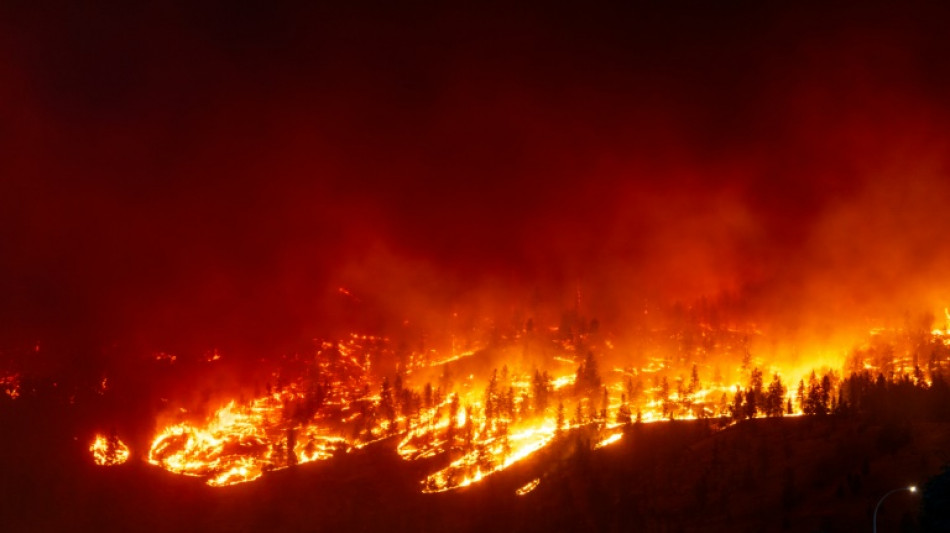
Wildfires threaten western Canada city as far north evacuated

Wildfires on Friday bore down on Kelowna in western Canada -- a city of 150,000 -- while efforts to clear Yellowknife in the far north turned it into a ghost town as scorching flames burned ever closer.
The two fronts in British Columbia and the Northwest Territories are just the latest in a summer of devastating wildfires across the country that have forced tens of thousands from their homes and left millions of acres scorched.
In Kelowna, officials described "a hard night" beating back flames, at times forcing crews to pull back and some firefighters to become trapped behind lines while making "heroic efforts" to rescue residents.
"We fought hard last night to protect our community," West Kelowna fire chief Jason Brolund told a briefing on Friday.
"A significant number of structures were lost," he said, but no injuries or fatalities were reported.
"It was like 100 years of firefighting all at once, in one night," he said, adding that he expects "another scary night tonight" under an eerie glow of the fires.
Nearly 2,500 homes and businesses on Kelowna's west side were ordered evacuated late Thursday, while another 4,800 were advised to be ready to leave at a moment's notice.
The city is nestled in the Okanagan Valley that is home to some of the country's top wineries.
The emptying of Yellowknife continued in the far north, meanwhile, with cars snaking along the lone highway connecting the remote capital of the Northwest Territories to southern Alberta province ahead of a 12:00 pm (1800 GMT) deadline.
The exodus has also continued by air, with thousands of residents flying out and an increased number of flights scheduled Friday to evacuate the regional capital's more than 20,000 inhabitants.
- 'Empty' -
The nearest evacuation center is 1,150 kilometers (700 miles) away, in Alberta, where several sites have been set up. Prime Minister Justin Trudeau will meet with refugees in the provincial capital Edmonton in the afternoon.
Air Canada pilot Chad Blewett, who flew one of the first relief flights out of Yellowknife, told public broadcaster CBC that the lakeside city was "pretty empty already."
The stragglers, he said, were mostly essential workers "building fire breaks and working with airlines (to facilitate evacuations)."
Crews have scrambled to erect defenses as the flames approached Yellowknife, while water bombers have been seen flying low over the city.
Strong winds over the next two days will send the fire, already within just a few kilometers of the city's perimeter, "in directions we don't want," Northwest Territories' fire information officer Mike Westwick said late Thursday.
Several military aircraft have already been dispatched, along with more than 120 soldiers to help beat back the flames.
Defense Minister Bill Blair told reporters "conditions remain very difficult" in the north, and warned that the highway out of the city was open "for now."
As the evacuation winds down, he said, "the priority (will now be) to make sure that Yellowknife and all its property are safe."
The flight from Yellowknife means half the population of the near-Arctic territory has been displaced.
Several towns and Indigenous communities were also already under evacuation orders.
- Record-setting wildfire season -
Canada is experiencing a record-setting wildfire season, with official estimates of over 13.7 million hectares (33.9 million acres) already scorched. Four people have died so far.
In addition, the fires have also emitted an unprecedented amount of carbon dioxide.
Scientists say human-caused global warming is exacerbating natural hazards, making them both more frequent and more deadly.
"It shows how quickly our climate is changing if a place like Yellowknife, so close to the Arctic Circle, is on fire," Adria McPherson told the CBC while fleeing the fires in the north by car.
Earlier this year, suburbs of Halifax on the Atlantic coast were also evacuated.
C.Stevenson--TNT